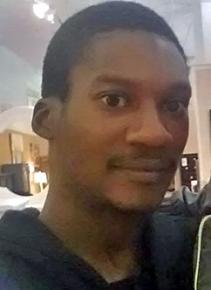Manufacturing a “terrorist threat”
and report from Rochester, New York, on an alleged terrorism plot that bears all the hallmarks of the FBI's ongoing record of entrapment.
OFFICIALS IN Rochester, New York, canceled the city's planned New Year's Eve fireworks display a day after the FBI arrested a man they claimed was planning a New Year's Eve massacre at a local bar. Twenty-five-year-old Emanuel Lutchman was charged with providing material support to the Islamic State in Iraq and Syria (ISIS), based on an alleged scheme to attack and possibly kidnap bar patrons using machetes and knives.
Politicians wasted no time in grandstanding. According to Gov. Andrew Cuomo, "The good news is that law enforcement worked." New York's Sen. Charles Schumer announced, "Law enforcement has once again thwarted a potential lone-wolf terrorist attack encouraged by ISIS. It is now clear that ISIS is focusing on identifying disaffected individuals here in America and encouraging them to act as lone wolves to commit evil acts."
The problem with this "lone wolf" narrative is that Lutchman wasn't the only one planning the alleged scheme. He was aided in his plans by no fewer than three police informants, one of who--identified in court papers as "CS-2" (CS stands for "confidential source")--was with Lutchman at the time of his arrest.

Having converted to Islam while in state prison for robbery, Lutchman reportedly became enamored with ISIS in recent months. He met CS-2 and others who turned out to be police informants. Lutchman was allegedly in contact with what he believed to be members of ISIS via social media, and became convinced that carrying out a successful operation would grant him membership in the group.
An affidavit from FBI Special Agent Timothy Klapec alleges that "Lutchman discussed with CS-2 doing assassinations and using a pressure cooker bomb."
However, Lutchman was far from the capable, determined jihadist that law enforcement has alleged. In the weeks leading up to New Year's Eve, after one of the other informants dropped out of the operation, Lutchman reportedly had doubts and considered calling the whole thing off. However, CS-2 "told Lutchman not to let [the informant's] backing out of the operation upset him," and encouraged him to continue.
The next day, CS-2 drove Lutchman to a local Walmart, where CS-2 "bought a machete, knives, zip ties, duct tape, ammonia and latex gloves," because Lutchman could not afford the $40 cost.
AS IT turns out, CS-2 was busy at work for the FBI and local law enforcement.
Gary Craig of the Rochester Democrat and Chronicle reported, "The informant CS-2 began working with the FBI around November 2013, the court papers state. He was once convicted of an attempted drug sale and served a year in jail on the charge. He also has a previous misdemeanor drug-connected conviction."
In 2014, CS-2 was instrumental in another terrorism related-arrest in Rochester. Mufid Elfgeeh, the owner of a Rochester mini-mart and pizza shop, was arrested and pleaded guilty in federal court to trying to recruit two men to ISIS. However, recently unsealed court records suggest a high degree of involvement by FBI informants (including CS-2) in that case, too, and a much more complicated picture than law enforcement admitted.
What did CS-2 get for his efforts? According to the same FBI affidavit, "As of December 2015, the FBI has paid CS-2 a total of approximately $7,400 in exchange for his cooperation in an unrelated investigation."
Lutchman, as it turns out, was a troubled young man, ripe for manipulation. When the owner of Merchants Grill, the bar where the alleged attack was to take place, was informed by the FBI of the plans after the arrest, he recognized Lutchman as a neighborhood panhandler. The Democrat and Chronicle reported that Lutchman "clearly had mental health issues and occasionally wandered outside Merchants Grill and picked up cigarette butts."
Lutchman's grandmother, Beverley Carridice-Henry, said her grandson was in and out of prison for minor crimes, suffered from mental illness, and was on and off his medication over the past year. Incredibly, she also claims that the FBI had attempted to recruit Lutchman himself as an informant several months preceding his December arrest.
"When he got out [of prison], they interviewed him and asked him to be an informant," Carridice-Henry said. "He said he wouldn't be an informant because he didn't know anyone who would do something like that, so how could he inform?"
THE NARRATIVE about the case told by law enforcement simply doesn't hold up. Lutchman was supposedly a dangerous, determined, "lone wolf"--but didn't have $40 to purchase weapons, and needed repeated encouragement from paid informants to not abandon his "plot."
Lutchman's case fits an ongoing pattern of FBI and law enforcement preying on young, poor and sometimes mentally ill men of color with the aid of paid informants who provide most of the planning, materials and initiative--only to foil their own plot in front of adoring politicians and cameras.
It should be a surprise to no one that the devastation wreaked by U.S. imperialism abroad, combined with intense police surveillance and repression at home, especially targeting Arabs and Muslims, has and will continue to produce "disaffected individuals" looking for justice or even revenge. The tragedy is that as yet, there is no effective political outlet for them.
Cases like Lutchman's also show that the actual "terrorist threat" to American lives is wildly exaggerated. The hype serves to generate ratings, fuel reactionary political campaigns like Donald Trump's and, ultimately, justify the "war on terror" in all its dimensions.
Our security is tied to the security of our brothers and sisters in the Middle East. As long as their civilians continue to be bombed, their resources pillaged and their governments manipulated for the gain of Western imperial interests, those of us in the U.S. will face the blowback of these policies.


